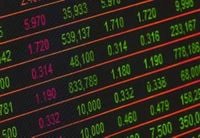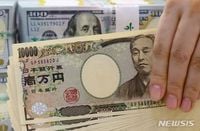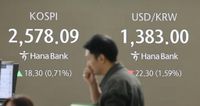On May 7, 2025, the Korean Won-Dollar exchange rate opened at a six-month low of 1380.0 Won, signaling a significant shift in the foreign exchange market. This marked a drop of 25.3 Won, the largest decline since April 14, 2025, when the currency fell by 25.8 Won. By 11:00 AM, the exchange rate had slightly rebounded to 1392.4 Won, but the initial drop was noteworthy as it was the lowest opening since November 5, 2024, when the closing price was 1378.6 Won.
The recent fluctuations in the Won-Dollar exchange rate can be attributed to escalating tensions between the United States and China regarding trade tariffs. Speculation is rife that the Taiwanese government is leveraging exchange rate depreciation as a bargaining chip in its trade negotiations with the U.S. This has resulted in a general strengthening of the Chinese Yuan and Japanese Yen as well.
Market analysts are increasingly concerned that the U.S. is on the brink of a ‘second Plaza Accord,’ which would see the U.S. pressuring its trading partners to devalue their currencies in a bid to reduce its trade deficit. This notion has prompted fears of a currency war, with the potential for further volatility in the foreign exchange markets.
According to Park Sang-hyun, a researcher at iM Securities, “As the U.S. intensifies its pressure on Asian currencies, a significant drop in the exchange rate is anticipated. This week, we expect the Won-Dollar exchange rate to fluctuate between 1350 and 1400 Won.”
Meanwhile, the Bank of Korea is closely monitoring the situation. Lee Chang-yong, the governor of the Bank of Korea, remarked during a press conference in Milan that the uncertainty surrounding U.S. tariff policies is affecting market expectations. He stated, “Even in the absence of an official meeting like a ‘second Plaza Accord,’ the mere discussion of exchange rate negotiations with the U.S. has a considerable impact on market expectations.” He also acknowledged the limitations on South Korea’s foreign exchange reserves, indicating that the country cannot manipulate its currency freely.
In the Tokyo foreign exchange market, the Dollar-Yen exchange rate also experienced a rise on the same day. As of 1:47 PM, the Dollar was trading at 143.210 Yen, reflecting a 0.52% increase from the previous session. The strengthening of the Dollar is linked to the announcement that the U.S. and China will engage in trade negotiations, a development that has bolstered investor confidence.
U.S. Treasury Secretary Scott Bessent is scheduled to meet with Chinese officials in Switzerland on May 10, 2025. This meeting is anticipated to address trade issues that have been a source of tension between the two countries. The prospect of an agreement could alleviate concerns regarding a slowdown in the U.S. economy, which has prompted increased Dollar buying.
In addition to the Dollar's rise against the Yen, the Euro also faced a decline against the Yen. The Euro-Yen exchange rate was recorded at 162.50, a 0.29% increase, while the Euro-Dollar exchange rate fell by 0.20% to $1.13440.
As the foreign exchange market continues to react to geopolitical developments, the Won-Yen exchange rate has also seen fluctuations. On May 7, the Won was valued at 976.77 Won per 100 Yen, which is an increase of 11.38 Won, or 1.18%, from the previous day. The exchange rate had previously dipped to a low of 951.11 Won but surged to a peak of 995.92 Won during trading before settling lower.
Interest in currency trading has surged, with discussions surrounding exchange rates generating over 1,202 mentions in recent days, indicating heightened investor attention.
As the U.S. prepares to announce trade agreements with major allies, anticipated volatility in the currency markets is expected to continue. The situation remains fluid, and market participants are advised to stay informed as developments unfold.
In light of these developments, the Federal Reserve is also holding a Federal Open Market Committee (FOMC) meeting from June 6-7, 2025, where it is widely expected to maintain the current benchmark interest rate. Market watchers are keenly anticipating insights from Federal Reserve Chairman Jerome Powell regarding future monetary policy, especially in the context of ongoing trade negotiations.
In summary, the foreign exchange market is currently navigating through a complex landscape shaped by trade negotiations, currency pressures, and economic indicators. As the U.S. and its trading partners engage in discussions, the impacts on currencies such as the Won, Dollar, and Yen will be closely monitored by investors and policymakers alike.






